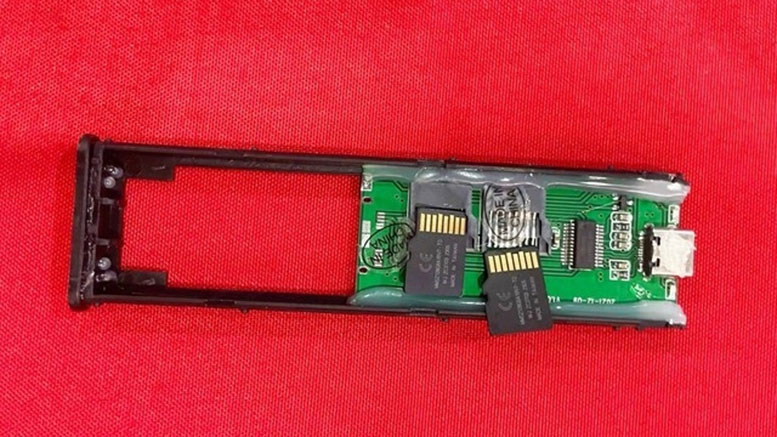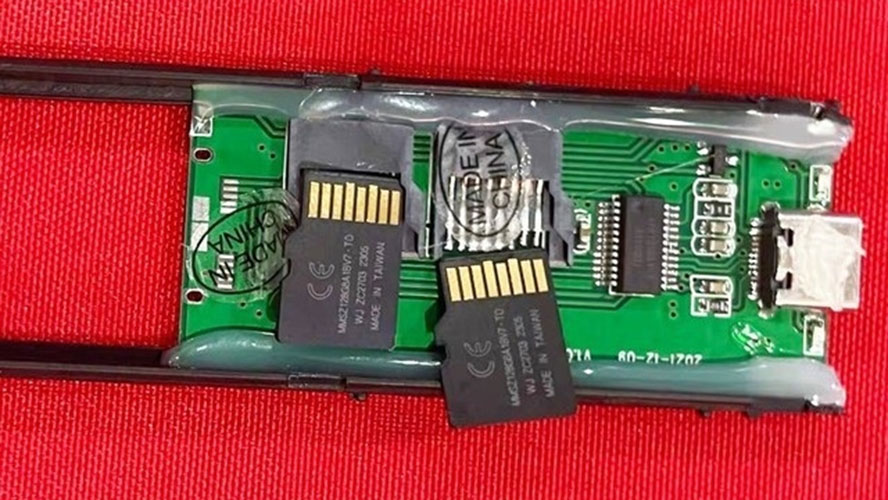Fake External M.2 NVMe SSD Has MicroSD Cards Inside
The cheap 512 GB drive also had an 'ancient' controller and a slow interface.

Imagine this: A PC user snaps up a bargain external M.2 NVMe SSD and is disappointed with the device’s performance, The transfer speeds were so poor they decide to look inside the USB Type-C connected drive case. To their dismay, the half-length PCB uncovered featured two microSD cards, an “ancient” controller, and a port wired for USB 2.0 speeds. These microSD card "SSDs" are actually showing up on market places, reports MyDrivers.
The discovery that cheap no-name products on sketchy online marketplaces can be fake or counterfeit appears to have taken the unlucky Chinese netizen in the piece by surprise. Despite horror stories, frequent warnings, and better judgment people continue to be attracted to goods sold at too-good-to-be-true prices from anything-goes marketplaces.
The unnamed netizen’s suspicions were aroused when their new 512 GB external M.2 NVMe SSD seemed to offer performance that wasn’t even respectable for an external HDD. He decided to take the mobile drive’s case off. You can see the images of what was discovered above below.
Above you can see the inner drive uses a pair of MicroSD slots populated with TF cards. We don’t know the memory card specs, speeds, capacities, or how they were configured. If the cards weren’t 256 GB each, the drive controller firmware might misrepresent their capacities – a common scamming trick. Further investigations showed the small controller chip you can see on the green PCB to be of a very old design. Moreover, the modern USB-C port was only wired for USB 2.0 data transfer performance.
According to the source report, the counterfeit external SSD victim would have seen device read speeds of 100 MB/s at best. MyDrivers also thought write speeds would be measured in tens of MB/s unless the twin MicroSDs were configured in RAID0 (unlikely).
Counterfeit, fake, mislabeled, mis-sold, and sometimes dangerous electronic products can easily be stumbled upon in unreputable online marketplaces worldwide. (Particularly interesting fake products and audacious scams sometimes make the pages of sites like ours). Stick to trusted brands and outlets, be cautious with purported bargains from less trusted sources, and use your common sense. If something is too good to be true, it is.
Get Tom's Hardware's best news and in-depth reviews, straight to your inbox.

Mark Tyson is a news editor at Tom's Hardware. He enjoys covering the full breadth of PC tech; from business and semiconductor design to products approaching the edge of reason.
-
Scott_21 Sadly these and many other fakes, especially electronics, can be found on Amazon and eBay, with fake positive reviews and sellers. It's really down to like the article says, too good to be true really is just that. I still use Amazon sometimes for smaller stuff like wires , but, I double check the sellers and the products.Reply -
JamesJones44 Reply
Even if you call out Amazon in a review claiming something is fake Amazon will just take down your review.Scott_21 said:Sadly these and many other fakes, especially electronics, can be found on Amazon and eBay, with fake positive reviews and sellers. It's really down to like the article says, too good to be true really is just that. I still use Amazon sometimes for smaller stuff like wires , but, I double check the sellers and the products.
I put a 1 star review on a product (deodorant to be exact) the product labeling font, scent, texture and color were completely different than what I have had before or find with local versions of the product from Target and Walmart. It was clear as day the product was either mislabeled or fake. Amazon took down the review saying the information I presented in the review "did not match the description of the product"... -
domih Reply
Same thing here. I got two negative reviews rejected for similar reasons.JamesJones44 said:Even if you call out Amazon in a review claiming something is fake Amazon will just take down your review.
I put a 1 star review on a product (deodorant to be exact) the product labeling font, scent, texture and color were completely different than what I have had before or find with local versions of the product from Target and Walmart. It was clear as day the product was either mislabeled or fake. Amazon took down the review saying the information I presented in the review "did not match the description of the product"...
When this happens to you, you easily deduce that it probably happens to other customers.
The conclusion is quite clear: you cannot trust the Amazon customer review process anymore (as it was in the early years) because of a clear conflict of interest from the modern Amazon. Amazon wants you to think that the Amazon web site is a happy community, a Lollapalooza-like consumerist place, a no-limit buffet...
...as long as you pay.
I closed my Amazon account years ago. -
cryoburner Reply
Usually these store pages on Amazon cover inventory from multiple sellers though. Just because one seller is distributing counterfeit merchandise (perhaps even without their knowledge), that doesn't mean that applies to the other sellers making the product available through that same listing. So a complaint about counterfeit merchandise might be better suited to a review of the individual seller rather than of the product itself. You didn't actually receive the advertised product, but rather something else in its place, so it's accurate to say that you weren't reviewing the product described on the store page. Contacting Amazon to report the issue and see if you can get a refund would be the thing to do in that case.JamesJones44 said:Even if you call out Amazon in a review claiming something is fake Amazon will just take down your review.
I put a 1 star review on a product (deodorant to be exact) the product labeling font, scent, texture and color were completely different than what I have had before or find with local versions of the product from Target and Walmart. It was clear as day the product was either mislabeled or fake. Amazon took down the review saying the information I presented in the review "did not match the description of the product"... -
JamesJones44 Reply
Oh they did refund it, they just didn't allow the review. BTW it was from a single seller, shipped by Amazon. Wouldn't have mattered Amazon would have taken it down anyway. You can read thousands of similar complaints on Reddit and other sites. It's not an isolated incident. Amazon as a trust worthy distributor ended years ago.cryoburner said:Usually these store pages on Amazon cover inventory from multiple sellers though. Just because one seller is distributing counterfeit merchandise (perhaps even without their knowledge), that doesn't mean that applies to the other sellers making the product available through that same listing. So a complaint about counterfeit merchandise might be better suited to a review of the individual seller rather than of the product itself. You didn't actually receive the advertised product, but rather something else in its place, so it's accurate to say that you weren't reviewing the product described on the store page. Contacting Amazon to report the issue and see if you can get a refund would be the thing to do in that case. -
Emperor Crusher This is a terrible article. Why? For starters, the title is inaccurate. NVMe is defined as a standard hardware interface for SSDs. The article shows this is a USB C interface, not an NVMe interface. Next, the definition of an SSD is a storage device containing nonvolatile flash memory. The article shows this has 2 SD cards which are nonvolatile flash memory. So, it's NOT "Fake" and it's NOT "NVMe". The corrected title of the article should read "External SSD has MicroSD Cards Inside". OK, so what!?Reply
The article does disclose a terrible drive with an ancient controller chip and a USB 2 interface which nerfs any possible speed benefit from this external SSD. THAT makes sense to write about.
I actually have a very good 64G USB 3.1 SSD sitting in front of me. It has read speeds in the 200-300 MBps range. Write speeds are also amazing and it has an SD style card chip properly soldered to the PCB. Based on Mark's article, I believe he would call this a "fake" SSD, but it's not. Here is a link to the 128G version.
https://www.amazon.com/VANSUNY-USB-Flash-Drive-128GB/dp/B08LGKDG1J?th=1
Inside is a SanDisk iNAND 8521 chip which, according to the SanDisk specs is spot on with the speeds I get experimentally. Blazing speeds for a USB Flash Drive.
https://datasheet.lcsc.com/lcsc/2105241638_SANDISK-SDINDDH4-128G_C2830406.pdf
So, Mark, how about writing an accurate article with an accurate title about a real USB External SSD Flash Drive with some amazing read and write speeds. -
wakuwaku ReplyMoreover, the modern USB-C port was only wired for USB 2.0 data transfer performance.
According to the source report, the counterfeit external SSD victim would have seen device read speeds of 100 MB/s at best.
As most, if not all Tom's Hardware readers would know, USB 2 tops out at 480Mbps, which due to the fact USB 2 is half-duplex, means you should see a max speed of ~40MBps for data transfer speeds. You usually don't exceed 35 based on my experience, but other people seems to have reached slightly higher. The fact that this writer says that a victim would see 100MBps read speeds on a USB 2 device is a big red flag that shows his lack of knowledge of the tech he is writing about. I suggest that this writer go through a standard Tom's Hardware refresher course on all the knowledge that has been incorporated in this site over the years. I mean their AI can do it, why can't you? -
Vorador2 Yesterday i saw on Google an ad about a 16Tb external SSD from an unknown Chinese company. I instantly reported it as false advertising.Reply
And Google reviewed my report and said the ad was perfectly fine. -
USAFRet Reply
It is an "external" drive.Emperor Crusher said:This is a terrible article. Why? For starters, the title is inaccurate. NVMe is defined as a standard hardware interface for SSDs. The article shows this is a USB C interface, not an NVMe interface. Next, the definition of an SSD is a storage device containing nonvolatile flash memory. The article shows this has 2 SD cards which are nonvolatile flash memory. So, it's NOT "Fake" and it's NOT "NVMe". The corrected title of the article should read "External SSD has MicroSD Cards Inside". OK, so what!?
As such, it will have some type of USB port. Here, what looks like USB-C.
It was apparently advertised as external NVMe.
An NVMe drive, in an external enclosure.
NOT 2x microSD cards.
So yes..FAKE.
